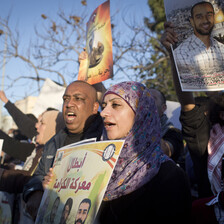The Electronic Intifada Fawwar refugee camp 13 May 2016

A Palestinian man displays a poster of Sami Janazreh during a protest calling for the release of prisoners from Israeli jails outside the Red Cross’ offices in Gaza City on 2 May.
APA imagesMahmoud Darwish — named after the great Palestinian poet — was hoping to celebrate his ninth birthday with his father, Sami Janazreh. Instead, he had to mark the day in a protest tent.
The tent was set up in Fawwar refugee camp, near Hebron, to support Janazreh, one of its residents, whose family originally hails from the ethnically cleansed village of Irak al-Manshiyeh. Imprisoned without charge or trial — under what Israel calls administrative detention — he has been on hunger strike since 3 March.
“Despite his young age, Mahmoud Darwish speaks as though he was a legal expert because of how closely he has been following his father’s case,” Rima Janazreh, Sami’s wife, told The Electronic Intifada. “Kids of his age are supposed to talk about sports or school but my son only talks about administrative detention and military trials.”
Sami Janazreh’s loved ones have, sadly, grown accustomed to being away from him. His stints in prison have totaled nine years.
During some of that time, he was held on charges relating to his involvement in the al-Aqsa Martyrs Brigades, the military wing of Fatah. At other times — like now — the Israeli authorities have refused to divulge if they have any evidence against him.
In the past few days, it was reported that Janazreh had suspended his hunger strike for a week.
However, his brother Kayed said that Sami had only agreed to take vitamins and liquids. That decision was taken after the Israeli high court postponed its review of a challenge mounted by Janazreh against his administrative detention.
“According to the international definition, the hunger strike continues as he still refuses to take solid food,” Kayed added.
Janazreh had stopped drinking water earlier this month in protest at being beaten while he was transferred from jail to Soroka, a hospital in the Naqab (Negev) region of present-day Israel.
Janazreh’s situation is not at all rare. Approximately 700 Palestinians were being held under administrative detention in March, according to Addameer, a prisoner rights group. That was more than twice the figure held around the time an uprising against the Israeli occupation erupted in October last.
Defiance amid doubts
Many Palestinian prisoners have undergone lengthy hunger strikes in the past few years. They include Khader Adnan, Hana al-Shalabi, Mahmoud Sarsak, Samer Issawi, Muhammad Allan and, most recently, the journalist Muhammad al-Qiq.
All of those hunger strikes ultimately succeeded in pressuring Israel into agreeing to release the prisoners in question.
However, doubts have also been expressed about the effectiveness of the tactic. A collective hunger strike by dozens of “administrative detainees” in 2014 failed to win concessions from Israel.
Undertaking his second hunger strike, Khader Adnan proved again last year that the tactic can get results. Adnan had previously been the first in a series of Palestinians to go on hunger strike in 2012.
He suggested that individual hunger strikes can make a greater impact than those by a group of prisoners.
“In the past, collective hunger strikes were used by Palestinian prisoners to demand tangible improvements in their conditions and the unity of the Palestinian political prisoners made such strikes possible,” Adnan told The Electronic Intifada.
“Solo hunger strikes, meanwhile, call for more radical demands such as release from jail or release from solitary confinement and as such they pose an enormous threat to the Israeli prison system.”
Adnan argued that hunger strikes are more powerful than trying to negotiate with the Israeli authorities.
They help draw attention to the injustices inherent in administrative detention and to the arbitrary nature of Israel’s policies.
While Israel has capitulated to the pressure exerted by hunger strikers on occasions, it has also used cruel methods to try and quell this form of resistance. They include passing a law enabling the force feeding of prisoners.
Divisions
One major hurdle that prisoners need to overcome is the political divisions affecting Palestinians both inside and outside Israel’s jails.
“The problem is not only the lack of media coverage [for hunger strikes],” Adnan said. “The biggest problem is that even prisoners from the same faction are divided. The divisions we see on the ground are reproduced behind bars and manifested in the lack of collective actions by prisoners. This leaves administrative detainees with no other option but to decide to go on hunger strike on their own.”
Janazreh’s case stands out in one important respect. Most of the hunger strikes in recent years were undertaken by prisoners affiliated to Islamic Jihad, Hamas or to left-wing groups. Janazreh is one of the very few prisoners linked to Fatah — the party in charge of the Palestinian Authority — to have employed the tactic.
“We received a phone call from the president [Mahmoud Abbas] and several high-ranking officials visited the tent in the camp to show their solidarity,” Kayed Janazreh, Sami’s brother, told The Electronic Intifada. “But we know that a statement here and there, or a few visits, are not sufficient.”
Kayed Janazreh was reluctant to criticize the Palestinian Authority, even though it has generally refused to support prisoners on hunger strike with any real vigor.
The Palestinian Authority’s intelligence forces cooperate with their Israeli counterparts in the interrogation of prisoners, and Israel has credited the PA with helping subdue the increased confrontation between Palestinians and occupation forces over the past several months.
While Khader Adnan argued that the Palestinian Authority has viewed recent hunger strikes as a threat to its legitimacy, Kayed Janazreh stressed that support for his brother has grown stronger in the past few weeks. Politicians representing Palestinians have been helpful, he added.
“Obviously we shouldn’t wait for two months until people take to the streets to show solidarity with a hunger striker,” he said. “But Sami’s defiance and insistence to go on will hopefully pay dividends.”
Meanwhile, Sami’s hands and feet are shackled to a hospital bed. He demanded that the shackles be removed when a visit from the International Committee of the Red Cross was scheduled.
He then refused to accept the visit because Israel would not remove the shackles, according to Rima, his wife.
None of Janazreh’s family members have been allowed to visit him in jail or in hospital since the beginning of his hunger strike. Rima applied for a visit permit through the Red Cross, but her request was turned down by the Israeli authorities.
Battle against system
Israel has been extremely obstinate in its denial of visiting rights to families of hunger strikers. Fayha Shalash, wife of Muhammad al-Qiq, was not granted a permit to visit her husband until a deal to end his strike had been reached.
Family members, particularly mothers and wives, have played pivotal roles in campaigning for their loved ones, shedding light on their hunger strikes, and mobilizing public support for them.
Muhammad Allan’s hunger strike would not have received as much attention as it did were it not for the resilience of his mother, Mazouza. She staged sit-in protests at the hospitals where her son was detained. In response, dozens of activists came to the hospitals to support Muhammad.
“Even supporting our husbands and visiting them while they are on the brink of death seems to be considered dangerous by Israel,” said Rima Janazreh.
Sami Janazreh is among several Palestinian prisoners on hunger strike. Fuad Assi, Adib Mafarjeh, Muhannad al-Azzeh and Muhammad Qawasmeh are on hunger strike in protest against administrative detention, isolation, or medical neglect.
Mansour Moqtada, a seriously ill prisoner, is undertaking a liquid-only fast. Serving a life sentence, Moqtada was seriously injured during his arrest by Israeli forces in 2002.
Another Palestinian prisoner, Majdi Yassin, announced that he was ending his hunger strike in the past few days. Yassin, who holds Swedish citizenship, was arrested at the Israeli-controlled crossing between the occupied West Bank and Jordan in April. He was traveling to Sweden at the time.
Yassin is due to be brought before an Israeli military court next week.
“This is not the battle of one prisoner; it’s a battle against an entire system,” Khader Adnan said. “And this form of protest will continue until administrative detention is abolished.”
Budour Youssef Hassan is a Palestinian writer and law graduate based in occupied Jerusalem. Blog: budourhassan.wordpress.com. Twitter: @Budour48





